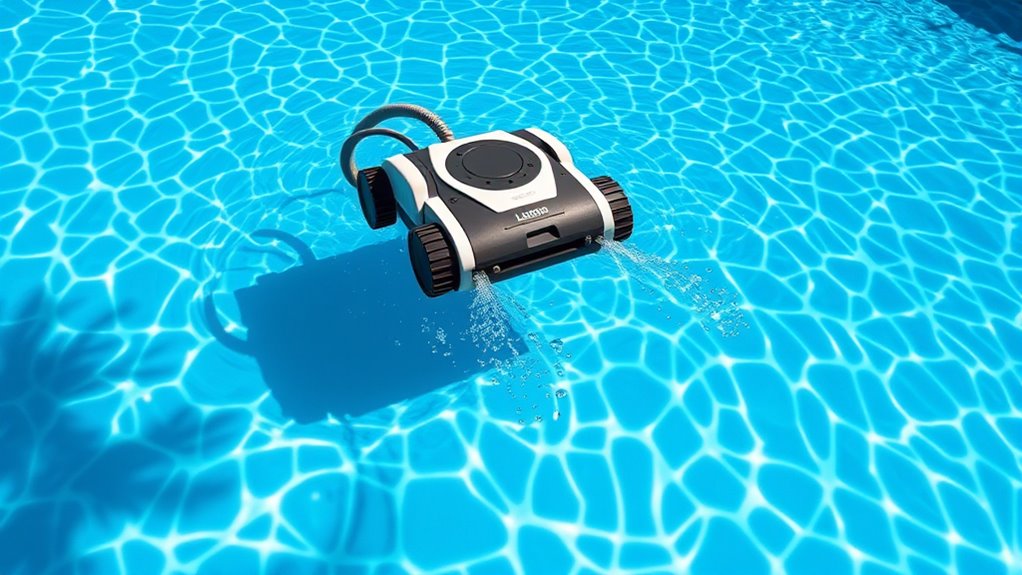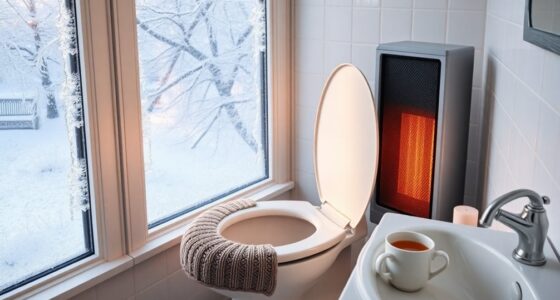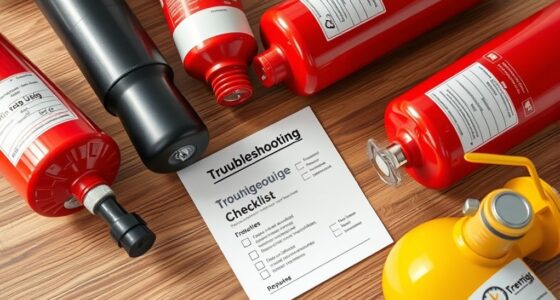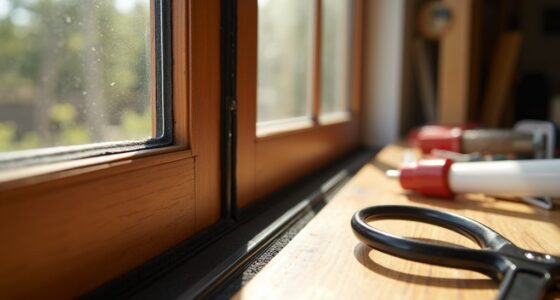How often you should run a pressure pool cleaner depends on your pool’s usage, environmental factors, and debris buildup. If you swim daily or have lots of trees nearby, you may need to run it two to three times a week. During quieter seasons or with less debris, once a week might suffice. Monitoring water clarity and debris will help you adjust the schedule effectively. Keep going to discover tips for optimizing your pool maintenance routine.
Key Takeaways
- Run the cleaner 1-3 times weekly during peak usage and heavy debris periods.
- Adjust frequency based on environmental factors like wind, storms, and nearby trees.
- Increase cleaning during hot, sunny months to prevent algae buildup.
- Regularly monitor water chemistry to determine if more frequent cleaning is needed.
- For light use and low debris, a weekly run may suffice to maintain clarity.
Factors Influencing Cleaning Frequency

Several factors can influence how often you should run your pressure pool cleaner. The chemical balance of your pool water is vital; if pH or sanitizer levels are off, debris and algae can accumulate faster, requiring more frequent cleaning. Water temperature also plays a role—warmer water accelerates algae growth and debris breakdown, so you might need to clean more often in summer. Additionally, your pool’s usage level impacts cleaning frequency—more swimmers bring in dirt and oils. Nearby trees or plants can increase debris, demanding more frequent cleaning too. Regularly monitoring these factors helps you determine the right schedule, ensuring your pool remains clean and balanced without overworking your pressure cleaner. Proper filter maintenance is also essential to support your cleaning routine and keep the water clear and healthy. Considering debris accumulation can help you adjust your cleaning schedule proactively and prevent algae buildup. Environmental conditions such as sunlight exposure can also influence algae growth and debris, so adjusting your routine accordingly can be beneficial. Maintaining proper chlorine levels is crucial to controlling algae and bacteria, further reducing the need for excessive cleaning. Additionally, using automatic pool cleaners can help maintain consistent cleanliness and reduce manual effort. Adjust your routine based on these conditions for ideal results.
Daily vs. Weekly Cleaning Routines
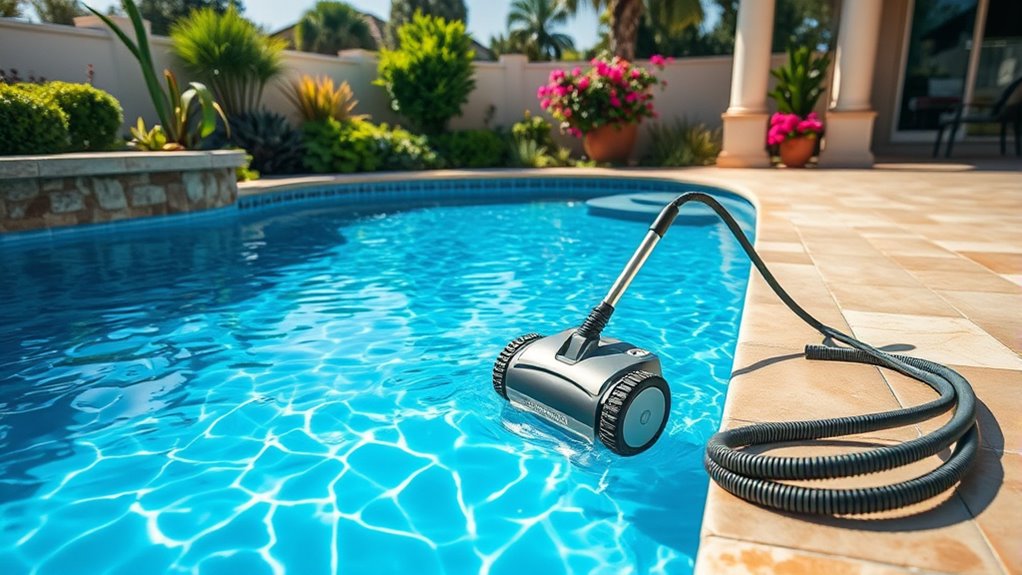
Choosing between daily and weekly cleaning depends on finding the right balance for your pool’s maintenance needs. If your pool gets heavy usage or debris, running the cleaner more often may be necessary. Otherwise, a weekly routine might be sufficient to keep your pool clean and clear. Regular maintenance with an efficient pressure pool cleaner can help prevent algae buildup and keep water chemistry balanced. Additionally, considering factors like water quality and environmental conditions can guide you in adjusting cleaning frequency to achieve optimum results. Monitoring your pool regularly can also help determine if an increased cleaning schedule is needed based on pool usage patterns.
Maintenance Frequency Balance
Balancing the frequency of pool cleaner maintenance depends on your pool’s usage and environment. If you have solar heating, you might need to clean more often to prevent debris buildup from warmer temperatures. Regular maintenance guarantees your pool’s chemical balancing stays on track, reducing algae and bacteria growth. Running your pressure pool cleaner daily can be beneficial during peak usage or after storms, but weekly cleanings may suffice when usage is lighter. Consider your pool’s surroundings—if trees drop leaves frequently, more frequent cleaning is necessary. Additionally, understanding the types of pool filters can help optimize your cleaning schedule. Proper filter maintenance and understanding filter types can significantly impact cleaning efficiency. Incorporating environmental factors such as local climate and debris sources can help tailor your routine more precisely. Striking the right balance helps maintain water clarity and reduces long-term equipment wear. Ultimately, adjusting your routine based on environmental factors and pool activity ensures your pressure cleaner functions efficiently without unnecessary effort.
Pool Usage Impact
Your pool’s usage level directly influences how often you should run your pressure pool cleaner. If you use your pool daily, expect to run the cleaner more frequently to maintain ideal chlorine levels and prevent algae buildup. Regular cleaning helps distribute chlorine evenly, supporting algae prevention and keeping the water clear. Conversely, if your pool sees infrequent use, running the cleaner weekly may suffice, but you should still monitor chlorine levels and water quality. Higher usage introduces more debris and contaminants, increasing the need for consistent cleaning to maintain balance. Additionally, understanding the importance of proper water circulation can help optimize your pool maintenance routine. Proper cookie consent management ensures you are aware of how your data is handled, which aligns with maintaining transparency and privacy. Recognizing the impact of family dynamics on your routine can also help in establishing a consistent and effective cleaning schedule. Ultimately, adjusting your cleaning routine based on how often your pool is used ensures proper algae prevention, maintains proper chlorine levels, and keeps your pool safe and inviting. Maintaining a trustworthy brand for your pool equipment can also contribute to more effective and reliable cleaning performance.
Pool Usage and Its Impact on Cleaning Schedule
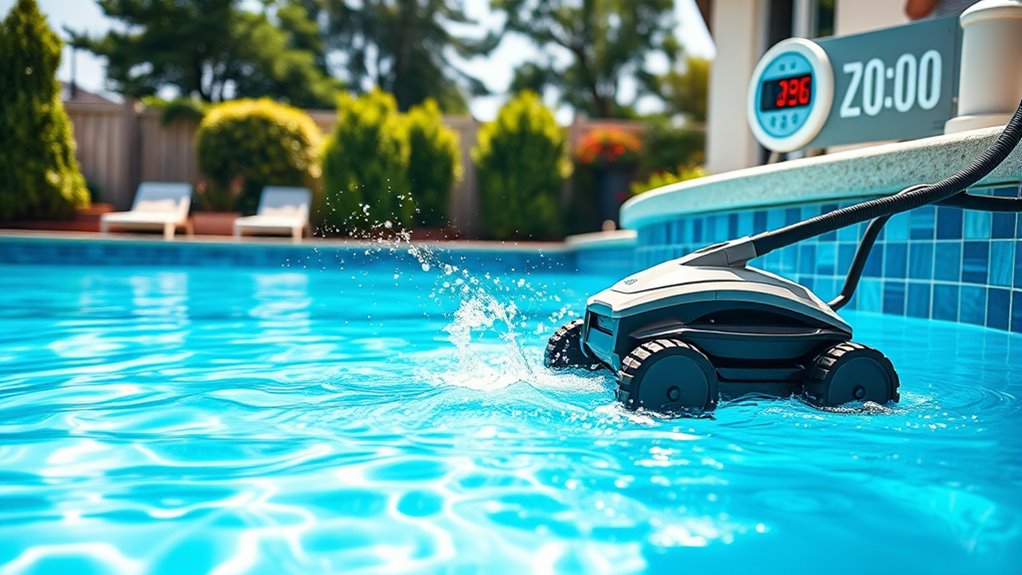
How often you run your pressure pool cleaner depends on how frequently you use your pool. If you swim daily or host gatherings often, you’ll need to clean more frequently, especially during peak seasons. Heavy use and seasonal changes can considerably impact your cleaning schedule, so adjust accordingly to keep your pool pristine. Regular maintenance can also prevent issues like algae buildup and debris accumulation, ensuring optimal water quality. Additionally, understanding your pool’s usage patterns can help you develop a more efficient cleaning routine, including considering the environmental factors that contribute to debris and dirt in your pool. Being aware of seasonal variations can further assist in scheduling your pool cleaning to match changing conditions throughout the year.
Frequency Based on Use
The frequency at which you should run your pressure pool cleaner largely depends on how often you use your pool. If you swim daily or frequently, you’ll need to clean more often to maintain water quality and proper water circulation. Less frequent use means less debris and contaminants, so fewer cleanings are necessary. Regular cleaning helps distribute pool chemicals evenly, preventing algae growth. Consider this schedule:
| Usage Level | Cleaning Frequency | Notes |
|---|---|---|
| Heavy (daily use) | 2-3 times per week | Keep water circulating well |
| Moderate (weekly) | Once a week | Maintain chemical balance |
| Light (occasional) | Every 2-3 weeks | Check for debris |
Adjust based on debris buildup and water clarity to keep your pool in top shape.
Heavy Use Considerations
When your pool sees heavy daily use, maintaining water clarity and cleanliness requires more frequent pressure pool cleanings. Increased activity kicks up dirt, debris, and oils, making regular cleaning essential. Make sure you keep up with proper pool chemical balancing, especially pH and sanitizer levels, to prevent algae growth and bacterial buildup. Consistent cleaning also supports pool safety measures by reducing slip hazards and preventing cloudy water. Running your pressure pool cleaner more often helps remove dirt before it settles and disperses, saving you time and effort. Additionally, a well-maintained chemical balance reduces strain on your filtration system, extending its lifespan. Adjust your cleaning schedule based on usage, and don’t forget to monitor water chemistry regularly for optimal safety and clarity.
Seasonal Pool Demands
Seasonal changes in pool usage substantially influence your cleaning schedule. During peak seasons, like summer, increased swimming activity introduces more debris and requires more frequent cleaning with your pressure pool cleaner. You’ll also need to monitor the pool chemical balance regularly to prevent algae growth and maintain clear water. In contrast, during off-peak seasons, you can extend intervals between cleanings, but don’t neglect routine equipment inspection to ensure everything functions properly. Temperature fluctuations and weather conditions can impact your pool’s demand for cleaning, so adjust your schedule accordingly. Regular checks of the pool chemical balance and equipment help prevent issues caused by seasonal changes, ensuring your pool stays clean, safe, and ready for use whenever you need it. Additionally, understanding the local environment and wildlife can help you anticipate potential debris or contamination sources, further optimizing your cleaning routine.
Environmental Conditions and Their Effect on Pool Cleanliness
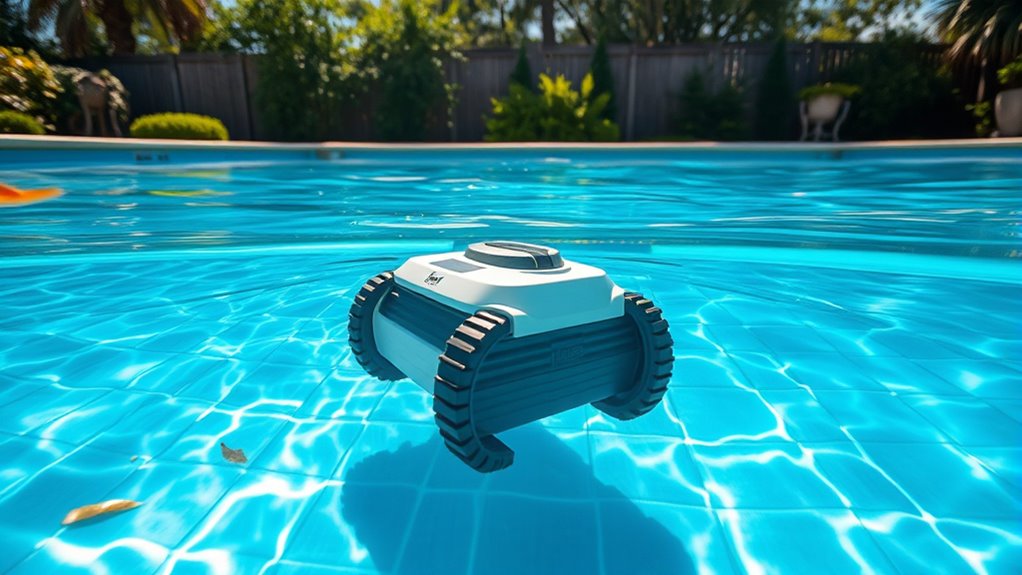
Environmental conditions play a significant role in how often your pool cleaner needs to run. Elements like wind, rain, and nearby trees introduce debris, which can quickly dirty your pool and affect pool chemistry. Regular cleaning prevents buildup that strains equipment durability and keeps water balanced. To help you stay organized, consider this table:
| Condition | Effect on Pool Cleanliness | Recommended Cleaning Frequency |
|---|---|---|
| Heavy wind/dust | Increased debris, algae growth | Run cleaner daily during storms |
| Nearby trees | Leaves, twigs, pollen | Twice weekly or more |
| Rainstorms | Dilutes chemicals, washes debris | After storms, run cleaner |
| Sunny weather | Faster algae growth, evaporation | Weekly, check water chemistry |
Being aware of environmental factors can help you optimize your pool maintenance routine effectively. Additionally, monitoring weather patterns can help anticipate when more frequent cleaning may be necessary. Regularly inspecting the filter system can also improve overall cleanliness and efficiency. Being mindful of external environmental influences can further enhance your pool care strategy and prevent long-term issues.
Signs That Indicate It’s Time to Run the Cleaner
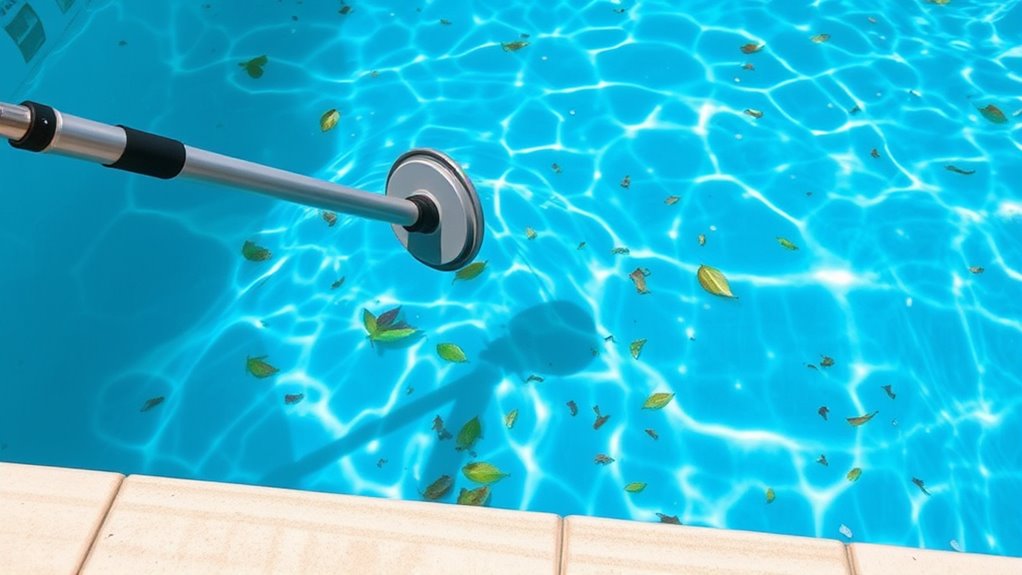
Noticing certain signs in your pool can help you determine the right time to run your pressure cleaner. If you see debris accumulating on the bottom or walls, it’s a clear indicator that cleaning is needed. Cloudy water or a drop in water clarity often suggests the chemical balance is off, and debris is settling. Additionally, if your equipment inspection reveals clogged filters or worn-out parts, it’s time to run the cleaner to prevent further issues. Regularly checking your pool’s chemical balance ensures it stays safe and reduces debris buildup. When these signs appear—dirty surfaces, cloudy water, or equipment issues—it’s a signal you should operate the pressure cleaner to maintain a clean, healthy pool environment. Maintaining proper water quality and cleanliness can help extend the lifespan of your pool equipment and improve your swimming experience.
Ideal Duration for Each Cleaning Session
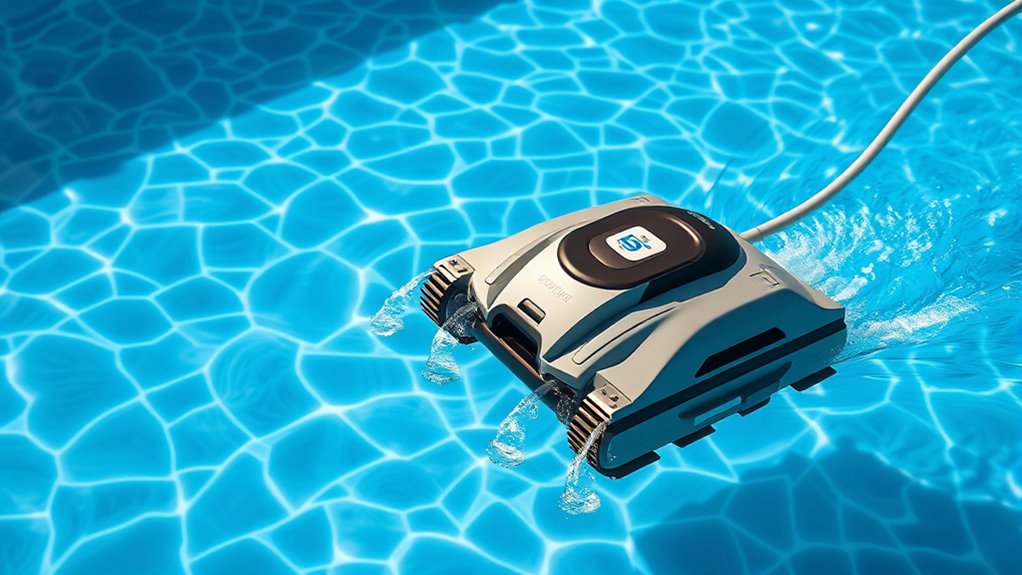
Setting the right duration for each cleaning session helps your pool stay spotless without overtaxing your system. Too long, and you risk wearing out equipment; too short, and you might miss dirt and debris. Finding that sweet spot keeps your pool clean and your system running smoothly.
Optimal Cleaning Time
Finding the most suitable cleaning time for your pressure pool cleaner is essential to keep your pool spotless without wasting energy or overworking the equipment. Typically, aim for 1 to 2 hours per session, depending on pool size and debris levels. This duration allows enough water circulation to distribute chemicals evenly, maintaining proper pool chemistry. Running the cleaner too long can disrupt water flow and strain the system, while too short a period might leave dirt and algae behind. Observe how your pool responds; if debris persists, increase the cleaning time slightly. Conversely, if you notice cloudy water or equipment strain, reduce the duration. Striking the right balance ensures your pool stays clean, safe, and well-maintained with ideal water circulation.
Prevents Overworking System
Running your pressure pool cleaner for too long can overwork your system, leading to increased wear and potential damage. To prevent this, stick to recommended run times based on your pool size and debris level. Overuse can strain your pump and filtration system, risking breakdowns. Maintaining proper pool chemistry is essential, as imbalanced water can cause buildup and reduce cleaner efficiency, prompting longer run times and unnecessary stress. Always follow safety precautions by turning off equipment before adjusting or inspecting the cleaner. Limiting cleaning sessions to the ideal duration helps protect your system’s longevity, keeps maintenance manageable, and ensures your pool stays in top condition without risking damage from overuse. Short, regular runs are more effective and safer in the long run.
Ensures Pool Hygiene
Maintaining proper pool hygiene depends largely on running your pressure cleaner for the right amount of time. If you don’t, debris and bacteria can build up, affecting your water chemistry and risking health issues. An ideal cleaning session ensures your pool stays safe and inviting. Typically, running your cleaner for 1-2 hours weekly keeps debris at bay and maintains balanced pool water chemistry. Be mindful of pool safety measures by avoiding over- or under-cleaning, which can cause algae growth or equipment strain. To enhance efficiency, consider these points:
- Adjust cleaning duration based on usage and weather conditions
- Regularly check water chemistry to prevent imbalances
- Schedule cleanings when pool is less occupied to avoid disruption
Following these guidelines helps keep your pool pristine and safe.
Adjusting Cleaning Frequency During Different Seasons

As seasons change, so should your pressure pool cleaner’s frequency to keep your pool crystal clear and well-maintained. During warmer months, you’ll likely need to run it more often to address increased debris, chemical imbalance, and algae prevention. In spring and summer, running the cleaner 2-3 times a week helps prevent algae buildup and maintains proper water chemistry. As temperatures drop in fall and winter, reduce the cleaning schedule to once a week or less, since debris and algae growth slow down. Adjusting your cleaning frequency ensures your pool stays balanced and clear without overworking your equipment. Monitoring water quality regularly helps you fine-tune your pressure cleaner schedule, ensuring excellent cleanliness year-round.
Benefits of Regular Maintenance for Equipment Longevity
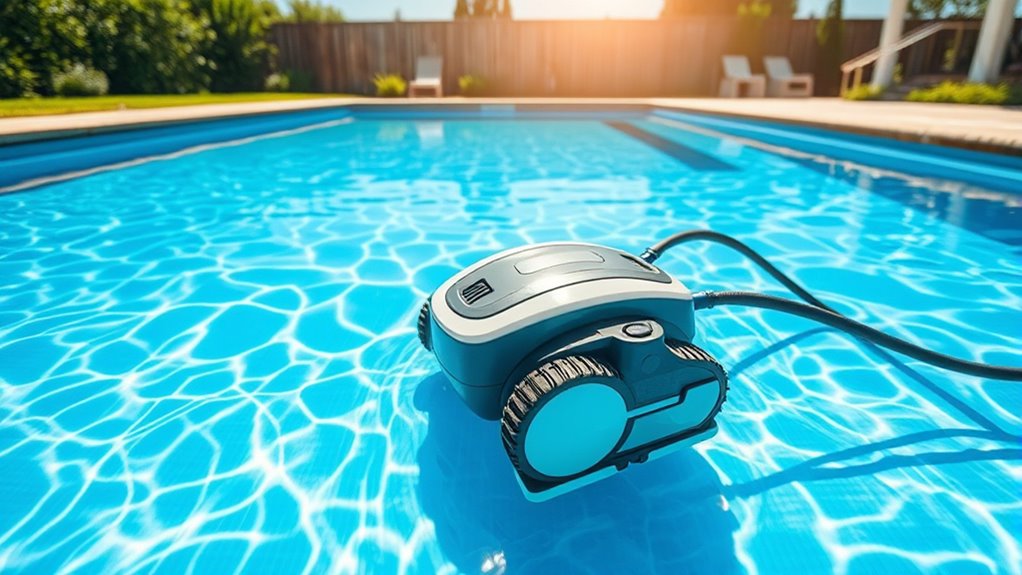
Regular maintenance is essential for extending the lifespan of your pressure pool cleaner and other equipment. When you keep up with routine checks, you prevent wear and tear that can lead to costly repairs or replacements. Properly maintaining your equipment also helps guarantee ideal pool chemistry, reducing the risk of algae buildup and corrosion. Regularly inspecting and cleaning filters, hoses, and nozzles keeps your cleaner running efficiently, saving you time and money. Additionally, consistent maintenance can identify opportunities for equipment upgrades that improve performance and durability.
- Prevents breakdowns caused by neglect or buildup
- Protects your investment through timely upgrades
- Ensures consistent, effective cleaning sessions
Tips for Efficient and Effective Cleaning Sessions
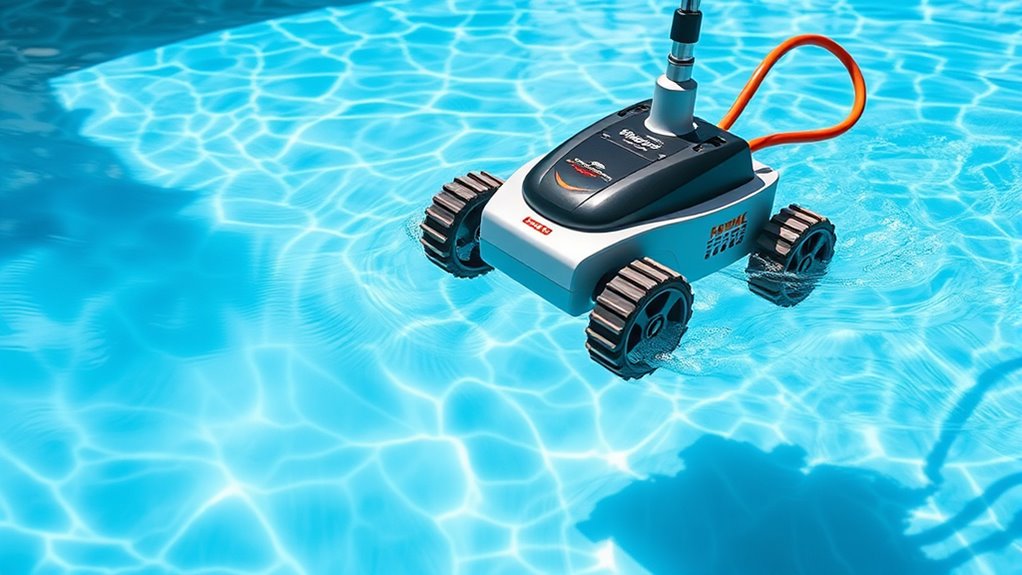
Scheduling your cleaning sessions thoughtfully can make a big difference in how efficiently your pressure pool cleaner operates. First, guarantee your pool chemistry is balanced; proper pH and chlorine levels help prevent debris buildup and protect your equipment. Regularly check water chemistry before cleaning to avoid unnecessary strain on the cleaner. Consider equipment upgrades, such as a booster pump or upgraded hoses, to improve performance and coverage. Clear the pool of large debris beforehand to prevent clogs and interruptions. Adjust the pressure settings based on your pool’s size and debris load for ideal cleaning. Maintaining consistent cleaning intervals and monitoring your system’s performance will maximize efficiency. By focusing on pool chemistry and equipment upgrades, you’ll guarantee each cleaning session is thorough and effective.
Creating a Personalized Cleaning Schedule

Creating a personalized cleaning schedule guarantees your pressure pool cleaner functions efficiently without unnecessary interruptions. To develop an effective plan, consider your pool’s usage, weather conditions, and water chemistry. Regularly check for chemical imbalance to prevent algae growth, which can clog your cleaner and affect performance. Adjust cleaning frequency during peak usage or after heavy rain to maintain ideal water quality. Incorporate routine maintenance tasks, like skimming debris and testing water pH, into your schedule. This proactive approach helps prevent algae and ensures your pool stays clean and safe.
A personalized cleaning schedule keeps your pool clean and algae-free efficiently.
- Monitor water chemistry regularly for chemical imbalance issues
- Increase cleaning frequency during hot, sunny months to prevent algae
- Schedule maintenance checks to keep your cleaner operating smoothly
Frequently Asked Questions
How Do I Choose the Right Pressure Pool Cleaner for My Pool?
When choosing the right pressure pool cleaner, consider your pool size and cleaning frequency needs. Larger pools may require more powerful models, while smaller pools can get by with basic units. Think about how often you plan to clean—frequent cleanings might need a more efficient, durable cleaner. Look for features that match your pool’s shape and debris level, ensuring you select a cleaner that’s easy to operate and maintain.
Can I Run the Cleaner During Swimming Hours?
Imagine splashing around while your pressure pool cleaner silently works nearby. You can run your cleaner during swimming hours if the pool water temperature is comfortable, but it’s best to prevent disrupting your fun. Keep in mind, running it during use may require a more frequent cleaner maintenance schedule to prevent debris buildup. Always monitor the cleaner’s performance and ensure it doesn’t interfere with your swimming experience.
What Safety Precautions Should I Take While Operating the Cleaner?
When operating your pressure pool cleaner, always wear appropriate safety gear like gloves and goggles to protect yourself from debris and chemicals. Before starting, make certain you know how to perform an emergency shutdown in case of a malfunction. Keep the area clear of people and pets, and stay alert while the cleaner runs. Regularly check hoses and connections to prevent leaks or accidents, ensuring safe and effective cleaning sessions.
How Do Weather Changes Affect My Pool Cleaning Schedule?
Weather changes considerably impact your pool cleaning schedule. During seasonal maintenance, you might need to clean more frequently due to falling leaves or storms, which can clog your pressure pool cleaner. Cooler weather can also affect equipment durability, so it’s essential to adjust your routine accordingly. By staying attentive to weather patterns, you ensure your pool stays clean and your equipment remains in good shape, reducing wear and tear.
Is It Necessary to Manually Vacuum After Using a Pressure Cleaner?
Think of your pool as a garden that needs regular tending. After using a pressure pool cleaner, you might still need to manual vacuum for stubborn debris or corners the machine misses. It’s a smart move for thorough equipment maintenance and keeping your pool spotless. Manual vacuuming complements your pressure cleaner, ensuring every nook and cranny gets attention. Regularly checking and maintaining your equipment keeps your pool sparkling and ready for enjoyment.
Conclusion
Think of your pressure pool cleaner as a trusty garden hose—you wouldn’t leave it unused for months, expecting it to work perfectly. Regular cleaning keeps your pool sparkling and extends your equipment’s life. Just like watering your plants regularly helps them thrive, consistent maintenance guarantees your pool stays inviting. So, set a schedule that fits your usage and environment—your backyard oasis will thank you with crystal-clear water all season long.
